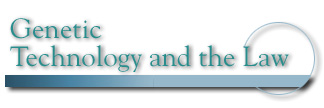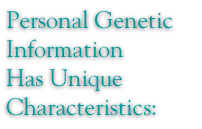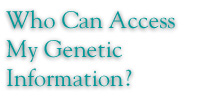|



Search our Site!
|
 |
 |
Nancy
Viscofsky, M.P.H., and Patricia Ward, M.S.
|
|
The rapid progress of genetic research
raises important issues regarding medical insurance. Genetic data
and medical history information require a unique set of guidelines
for this fast-emerging science. Potential access to people's genetic
information by insurance companies, employers and other institutions
presents potentially serious ethical conflicts between the patient,
physician, researcher and the insurance industry. Genetic material
can remain stable over time, so storing specimens in anticipation
of future tests not yet developed raises issues of an individual's
control of his or her own genetic information. In this issue of the
newsletter we will begin a series of articles to help you better understand
the impact of the genetic technology on insurance and how legislation
is beginning to address these issues. This first article will focus
on what is genetic information and who has access to your genetic
information.
| |
|
 |
| |
Genetic information is defined as data about
genes, gene products, or inherited characteristics. This information
can come from several sources including genetic testing, testing
for the presence of a protein in blood or tumor tissue, or
from physical examination noting features suggestive of an
inherited condition, such as, the presence of freckling and
polyps associated with Peutz-Jegher syndrome. Conventional
medical records (blood pressure, medical history, etc.) differ
from genetic medical information in several important ways.
Safeguards to protect the special nature of these documents
are starting to be addressed by the insurance industry, lawmakers,
and medical institutions.
|
| |
 |
| |
| 1. |
Genetic
information, which can show a predisposition to a disease
, is different from medical data that indicate a diagnosed
illness. For example, an individual who has inherited
a genetic alteration associated with HNPCC has an 80%
lifetime risk of developing cancer. This risk is based
on estimates made after studying many people with HNPCC.
However, the risk of cancer asociated with having an HNPCC
mutation is not 100%, so having an inherited predisposition
does not mean that cancer will definitley develop. At
this time, genetic testing does not provide all the answers
about a person's medical future.
|
| 2. |
DNA
provides information not just about the patient, but also
about the patient's entire genetic family, including siblings,
parents, and children. |
|
| |
|
|
 |
| |
Recent changes in the health
care industry have made the information contained in our medical
records more readily available to third parties, such as insurance
companies and employers. This trend has been influenced mainly
by managed health care systems, which often have very complex
referral and authorization practices. Access to our medical
information has also been facilitated by the use of electronic
medical records systems. It is important for the consumer
of medical care to be aware of this. The process of applying
for health insurance or simply filing an insurance claim for
reimbursement for a routine medical appointment often involves
signing a release. This release may allow your personal medical
information to be sent to any number of third parties, including
your own insurance company, your employer and possibly the
Medical Information Bureau (MIB), a database that is available
to more than 600 health, life and disability insurance companies.

There are some steps you can
consider to try to minimize the amount of medical information
that is released. Discuss your concerns about confidentiality
with your doctor and ask your doctor to send only the information
necessary to justify a particular referral or procedure, not
your entire record. Carefully read any statement you are asked
to sign for release of your medical information and consider
changing the wording to limit the amount of information that
may be sent, such as specifying the date of the clinic visit
from which information can be sent. You may want to find out
whether any of your medical information is on file with the
MIB and, if so, whether the information is accurate. To receive
information about how to request a copy of your file, write
the Medical Information Bureau, P.O. Box 105, Essex Station,
Boston, MA 02112, or call 617-426-3660.
|
| |
| |
|
Back to the Top
|






